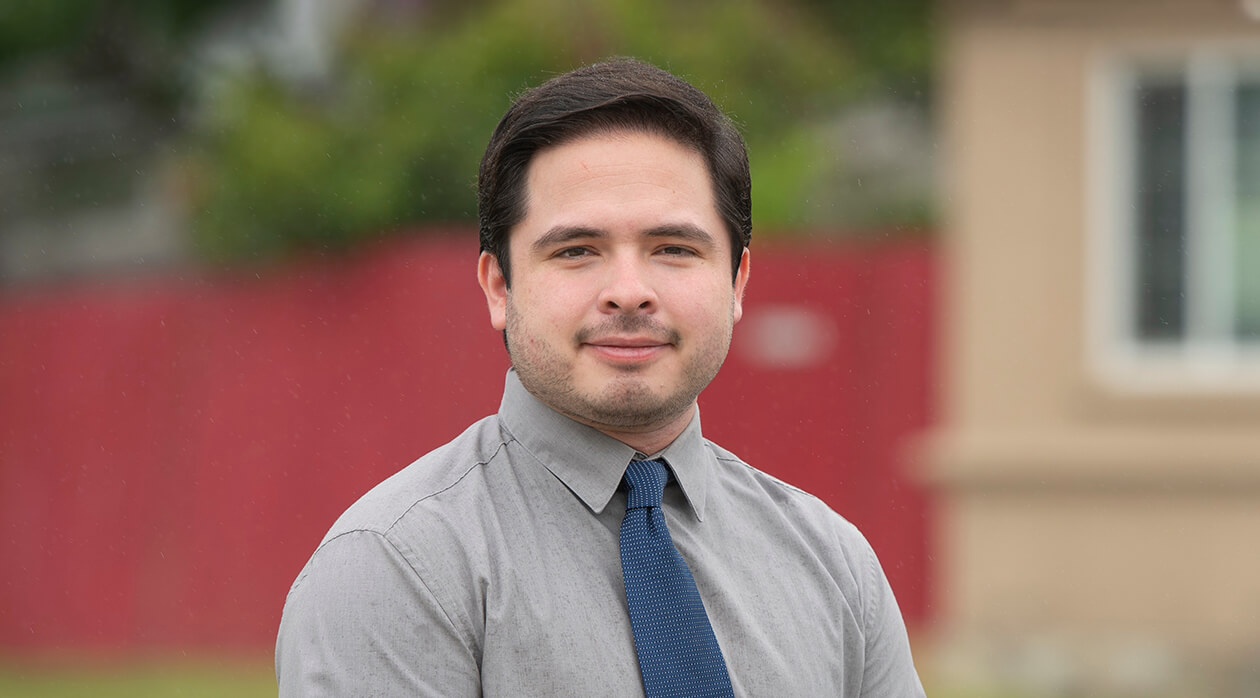Graduating Cal State LA student seeks to discover order in chaos of the universe
He will start an astrophysics Ph.D. program at Princeton in the fall
By Henry Fuhrmann | Cal State LA News Service
As an astrophysicist, Roberto Alexander Tejada Arevalo seeks to discover order in chaos, developing computer tools to sift through reams of data to detect planets in star systems beyond our own.
Tejada’s path through life has likewise been a quest to turn disorder into stability and opportunity.
After leaving El Salvador at age 9, he overcame the culture shock of moves to Los Angeles and the Midwest, as well as family discord and continual financial barriers, to become an honors student in math and science. When Tejada ran out of money for community college, he parlayed a detour to fast-food work into a job as a labor organizer and the break he needed to get back to his studies.
Tejada, 26, is graduating in May from Cal State LA’s College of Natural and Social Sciences with a Bachelor of Science in Physics, with minors in mathematics and philosophy. The Westminster resident, who achieved a GPA of 3.9, will enroll in the fall in a doctoral program in astrophysical sciences at Princeton University, with full funding for six years.
He is especially proud to stand as a Latino immigrant scientist who has defied the notion that “these beautiful and significant fields do not welcome us.” Science, he says, requires no special intellectual gifts, just “hard work and ardent passion.”
Tejada recounts his family’s struggles after his parents split up—including wrenching moves from Los Angeles to Minnesota and back again as his mother pursued work. For him, these were not hurdles, but experiences that helped him build resilience and adaptability.
“I had to really adjust to almost different planets, over and over again,” he says.
After returning to Southern California in the middle of 11th grade, Tejada discovered the work of Brian Greene, Stephen Hawking and Michio Kaku, theoretical physicists and popularizers of science who helped inspire his career choice.
Tejada excelled at Morningside High School in Inglewood, graduating in 2012, and enrolled at El Camino College. But for financial reasons, he had to drop out and find a job after only one semester.
While working at a Taco Bell in South Los Angeles, Tejada inquired about a labor campaign advocating for a $15 minimum wage. He impressed one of the organizers from the Service Employees International Union, who hired Tejada to work on the effort. He spent much of 2013 traveling across the United States, giving speeches, meeting activists and helping coordinate worker rallies and strikes.
“It was the perfect opportunity for me to start doing something,” Tejada recalls.
Connections he made through the union job led him to Los Angeles City College (LACC), where a STEM program director encouraged Tejada to resume his education and helped him land a coveted full-tuition President’s Scholar award. The budding astrophysicist was suddenly back on track at age 20.
After receiving his associate degree in physics in 2017, he considered offers from prominent programs at several University of California campuses. But Tejada chose to enroll at Cal State LA that fall, in part so that he could remain in Los Angeles and continue his job at LACC mentoring low-income STEM students.
“Rob is a dreamer. Rob's journey through education at Cal State LA truly shows the power of dreams,” says Professor Susan Terebey of the Department of Physics and Astronomy. “It has been wonderfully rewarding for me to help guide and see Rob’s development as a scientist while in my astrophysics research group.”
Tejada credits Terebey, “an amazing mentor,” with directing him to opportunities to conduct research alongside established scientists at Cal State LA and through two summer programs for students from traditionally underrepresented groups. His studies of exoplanets, or planets beyond our solar system, will provide a foundation for his Ph.D. work at Princeton and soon result in his first publication credits as a co-author of two journal articles.
In summer 2018, under CAMPARE, which promotes education in astronomy, Tejada worked with researchers at UC San Diego to use artificial intelligence to detect low-mass dwarf stars, believed to be fertile sources for planet hunting, in sky survey data. Last summer, he was accepted to Cal-Bridge, a collaboration of the California State University and UC systems that seeks to prepare students for future Ph.D. studies in physics and astronomy. Tejada worked with scientists at Stanford University to upgrade a computer tool to better predict the orbits of directly imaged exoplanets.
At Cal State LA, Tejada says, he benefited from being part of a small department offering students close collaboration with the faculty. In particular, he extols Terebey’s availability to her students and the perspective she brings as an academic who broke barriers in her generation as a woman working in physics and astronomy.
“Absolutely, I've had a really good experience,” Tejada says. “If I hadn't gone to Cal State LA, I wouldn’t be going to where I'm going right now.”
Tejada, who has worked as a visitor guide at the Griffith Observatory, hopes to perform public outreach about science in addition to teaching and conducting research after Princeton.
Wherever he goes, he vows to keep aiming high.
“My mother held three jobs and, at times, did not eat through the day to make the most of our resources,” Tejada wrote in a personal essay. “Each time she cried alone on the couch over not being able to pay the rent, put enough food on the table, keeping us healthy and happy, I promised myself to make my future goals here worth her sacrifice.”
####
